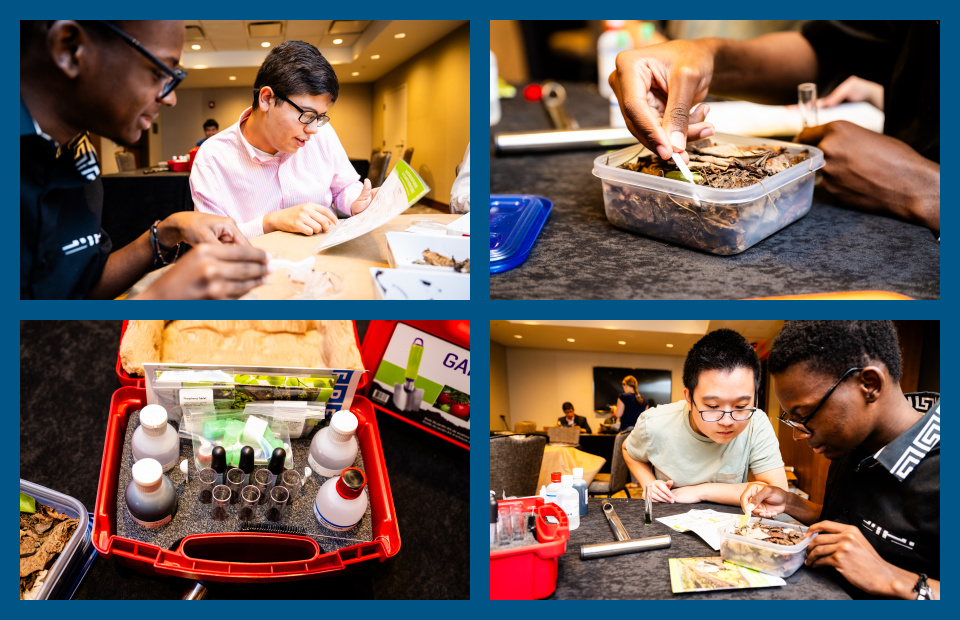STEM Outreach, STEM Research Grants
Society for Science fuels innovation with $110K in educator grants, transforming classrooms for student STEM research

Society for Science has recognized 41 exceptional educators with awards through its STEM Research Grants program, an initiative dedicated to advancing hands-on science education in middle and high school classrooms nationwide.
These educators will be receiving the STEM Research Grants in two forms: (1) research kits assembled and distributed to teachers by Society for Science and (2) funds paid directly to teachers intended for STEM-related equipment. The funds vary between $2,000 and $5,000, based on what the teacher requested for their classroom. By expanding the array of available equipment and materials, the grants provide students with more diverse research opportunities. Students can explore a broad spectrum of research areas, from electronics and coding to environmental science and ecological studies, fostering inquiry and a foundation for future scientific leaders.
The Society’s STEM Research Grants program, sponsored by Regeneron, is committed to promoting equity and inclusivity, ensuring that aspiring engineers and scientists of all backgrounds, regardless of their location, race or ethnicity, have equal opportunities. By actively fostering an environment that embraces diversity, the program aims to break down barriers and create a more equitable landscape in STEM education, empowering students to pursue and excel in scientific fields, regardless of their individual circumstances.
“Congratulations to the 41 recipients of this year’s STEM Research Grants. These grants serve as a catalyst in classrooms across the country, igniting student curiosity and exposing learners to tangible, real-world applications of STEM. These grants play a crucial role in shaping an inclusive landscape of scientific exploration,” said Maya Ajmera, President & CEO of Society for Science and Executive Publisher of Science News.”
This year’s award recipients include educators from 24 states, Puerto Rico, the U.S. Commonwealth of the Northern Mariana Islands and American Samoa, emphasizing the program’s widespread impact and diverse representation.
Priority consideration is given to educators who serve students from low-income communities, including students of underrepresented and underserved backgrounds. Everyone in this year’s cohort is based in a public school. Notably, 73% teach at Title I schools. Approximately 72% of students benefitting from the grant hail from underrepresented backgrounds, including American Indian, Alaska Native, Black and Latinx demographics.
Empowered by the Society’s STEM Research Grants, students will have the ability to venture into independent research projects that extend beyond their standard curricula, leading to opportunities to showcase their work in science fairs. This year, the funding will be used to acquire cutting-edge EEG equipment for one classroom, enabling students to explore brain activity. Other teachers will purchase items such as data loggers, a plastic identification machine, stereomicroscopes, and additional resources like 3D printers, hydroponic kits, and robotics materials.
See the full list of 41 STEM Research Grantees here.
Among the 41 awardees, 19 teachers will be supplied with research kits, and 22 educators will receive funds, each up to $5,000, designed to ignite creativity and amplify student exploration in the realm of their genuine scientific interests. The kits, valued at $1,000 each, encompass four distinct types tailored to enhance varied types of available classroom resources.
This cycle recorded a notable increase in interest in the STEM Research Grants program, with 311 final applications—a rise of 80 compared to the previous year and a substantial 189 more applications than two years ago—reflecting a growing engagement among educators in this program.
This year, the kits for each teacher will contain 3 Arduinos, 2 PocketLab Voyagers, 1 Leaf Pack and 1 Soil Test Kit with a refill:
- Arduino Starter Kits – Each STEM kit includes three Arduino Starter Kits. With this open-source hardware and software platform, students can get started on learning about electronics. Available in a variety of languages and simple to use in any location, teachers can lead students through projects about voltage, current, coding and the fundamentals of programming. Students can build innovative prototypes with Arduino boards for research projects with this kit.
- Leaf Pack Stream Ecology Kit – Students will dive into the fascinating world of freshwater ecosystems with a field kit, created by aquatic specialists and educators from the Stroud Water Research Center and LaMotte. Unveiling the secrets of streamside forests and aquatic life, this kit empowers students to explore the intricate relationships between streams, food chain dynamics, and the impact of pollution. Kits include six mesh bags, a stainless-steel strainer and DiscoveryScope® to spark curiosity and enable engaging, hands-on research into the diverse realm of freshwater macroinvertebrates and their habitats.
- LaMotte® Garden Kit – Each kit includes one soil test kit with a refill, equipping students with tools to conduct precise soil analysis. The kit enables students to perform rapid test procedures and reference laminated color charts to measure concentrations of nitrogen, phosphorus, potassium and soil pH. Key components include a pH Indicator, Nitrogen Extracting Solution Phosphorus Test Tablets and more, ensuring students engage in a scientifically rigorous exploration of soil composition and garden analysis.
- PocketLabVoyagers – Each STEM Research Grantee receives two PocketLab Voyagers. This gadget can fit into one’s pocket, hence the name, and enables students to conduct research from anywhere. The small pocket laboratory can help students explore physics, weather, climate studies and engineering topics via sensing capabilities that measure acceleration, angular velocity, magnetic fields, altitude, infrared rangefinder and more. Users can stream real-time data with the Pocket Lab app to their own devices.
Over the past several years, the Society has remained steadfast in its dedication to propelling STEM education forward by providing classrooms with improved research equipment. To date, the Society has distributed over 9,100 comprehensive research kits and $885,000 of funding to 697 dedicated educators, with a special emphasis on supporting educators serving historically underrepresented student communities in STEM. These educators represent all 50 states, Washington D.C., American Samoa, Guam, Mexico, Northern Mariana Islands, Peru, Puerto Rico and Uruguay.
The Society’s STEM Research Grants program is sponsored this year by Regeneron. For more information, please visit https://www.societyforscience.org/outreach-and-equity/stem-research-grants/


